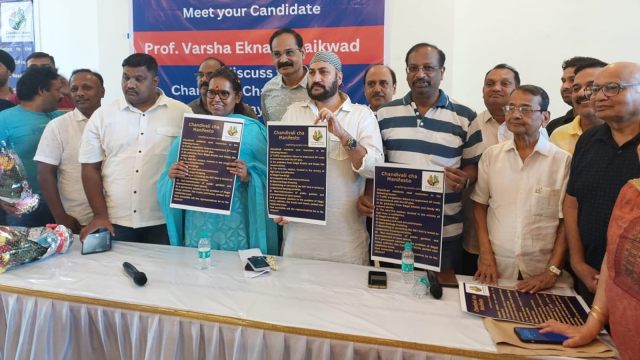In Mumbai, residents’ collectives pitch hopes, issues to candidates
Many citizen forums have drafted their manifestos listing their expectations from the elected candidates thereby inviting them for open house discussions.
 The drafting of a “citizens’ manifesto” was first done by the Chandivali Citizens’ Welfare Association (CCWA) highlighting all local pressing issues, often overlooked by political parties. (Express Photo)
The drafting of a “citizens’ manifesto” was first done by the Chandivali Citizens’ Welfare Association (CCWA) highlighting all local pressing issues, often overlooked by political parties. (Express Photo) As six Lok Sabha constituencies in Mumbai are set to vote on May 20, a large number of citizen forums and residents’ associations across the city have put forth their demands to the contesting candidates. These citizen forums have drafted their manifestos listing their expectations from the elected candidates thereby inviting them for open house discussions.
Many candidates are seizing the opportunity to engage directly with the community, listening to their concerns, understanding their needs, and making promises accordingly. The drafting of a “citizens’ manifesto” was first done by the Chandivali Citizens’ Welfare Association (CCWA) highlighting all local pressing issues, often overlooked by political parties. Named ‘Chandivali cha Manifesto’, the manifesto lists issues ranging from infrastructure and pollution to traffic and taxation.
“This is a festival of democracy and we need to change the narrative of elections. Instead of candidates calling out each other, they should address local issues and earn people’s votes,” said Mandeep Singh Makkar, founder of CCWA.
According to Makkar, the lack of corporators prompted the need for them to draft their manifesto and all the unaddressed complaints became points of the draft. Varsha Gaikwad, Congress candidate from Mumbai North-Central, met with Chandivali citizens May 5, promising to address their concerns regardless of her election outcome.
BJP candidate advocate Ujjwal Nikam is scheduled to meet them on May 12 Sunday.
In the Mumbai North constituency, where BJP’s Piyush Goyal and Congress’s Bhushan Patil are contesting, many citizen charters are driving the electoral narratives. Mumbai March, representing the citizens of this constituency, presented their manifesto to the candidates presenting the issues concerning the environment, infrastructure, and slum rehabilitation.
The issue that stood out in their manifesto was the river rejuvenation projects. “River clean-up as a part of rejuvenation efforts are on but quite slow. Cement concretisation of river beds and basins are killing the life of rivers, practically making them drains,” says Avinash Thawani, a Borivali resident who is a part of Mumbai March.
In the same constituency, another citizen group – We All Connect (WAC) — surveyed via Google Forms to understand hyperlocal issues to draft their manifesto majorly highlighting the issues of poor road infrastructure, particularly the absence of connecting roads.
Santy Shetty, the founder of WAC said, “The consensus of people here was ‘no roads, no votes’. However, we encouraged them to vote and we came up with a manifesto that had citizens’ demands.”
Action for Good Governance and Networking in India (AGNI), uses video documentaries to advocate for the right candidate irrespective of the political party emphasising the need for candidates to prioritize infrastructure, healthcare, and education.
Mario Fishery, the editorial board member of AGNI, calls for “equitable infrastructure” and inclusive roads accommodating both vehicles and pedestrians.
“It is important to address the root causes to find a permanent solution for the ongoing issues like water shortage, open spaces, and combating sea and river pollution,” said Fishery. In the Mumbai North West constituency, the Lokhandwala Oshiwara Citizen’s Association (LOCA), aims to boost voter turnout by drafting a manifesto that reflects voters’ demands.
“The manifesto, followed by a public meeting with the candidates may drive the polls in our constituency as this manifesto holds the pulse of the citizens,” said Dhaval Shah, director of LOCA.
Even though this election is parliamentary, the citizens say that it is very important for the Centre to stay in the loop with the local problems. “India is no longer what it was a few years ago. A collaborative and constructive approach from the candidates is appreciated and citizen forums act as the mediator,” Shah added.
The Govandi Citizen Cell (GCC) recently shared their manifesto with Mumbai North-East Congress candidate Sanjay Patil, addressing concerns regarding infrastructure, environment, and civic issues. They plan to discuss their manifesto with BJP’s Mihir Kotecha soon.
Shaikh Faiyaz Alam, the founder member of GCC said, “We put forth the hanging issues of slum development in Govandi and policy amendments in slum regulations which would solve major issues of this area.”
One point that every citizen forum across Mumbai underscores is the accessibility of the elected representatives. According to them, the access to the elected candidates is hindered by many of their associates. Shetty of WAC said, “The elected representatives should hold quarterly meetings like a janata darbar with the citizen forums to implement whatever is needed for the citizens.”







